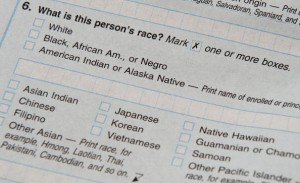Black or African American?

Paul J. Richards / AFP/Getty Images
The 2010 Census form had one option for "black, African American or Negro."
What do you say: “black” or “African American?” As someone who regularly writes about race and demographics, I often find myself using both terms interchangeably. But there is no clear on consensus on which term is most accurate or preferred, as Associated Press reporter Jesse Washington writes in a story this week on the debate.
Washington notes that the term “African American,” which came from the black intelligentsia, became popularized after the Rev. Jesse Jackson used it in the 1980s. Jackson told reporters at the time: “Every ethnic group in this country has a reference to some land base, some historical, cultural base. African-Americans have hit that level of cultural maturity.”
But not everyone today prefers to be called African American. According to a January 2011 The Wall Street Journal/NBC poll [PDF], 42 percent of respondents said they preferred to be called black, compared to 35 percent who preferred African American (13 percent said it didn’t matter). From Washington’s story:
“I prefer to be called black,” said Shawn Smith, an accountant from Houston. “How I really feel is, I’m American.”
“I don’t like African-American. It denotes something else to me than who I am,” said Smith, whose parents are from Mississippi and North Carolina. “I can’t recall any of them telling me anything about Africa. They told me a whole lot about where they grew up in Macomb County and Shelby, N.C.”
Gibré George, an entrepreneur from Miami, started a Facebook page called “Don’t Call Me African-American” on a whim. It now has about 300 “likes.”
“We respect our African heritage, but that term is not really us,” George said. “We’re several generations down the line. If anyone were to ship us back to Africa, we’d be like fish out of water.”
“It just doesn’t sit well with a younger generation of black people,” continued George, who is 38. “Africa was a long time ago. Are we always going to be tethered to Africa? Spiritually I’m American. When the war starts, I’m fighting for America.”
There are complexities beyond those who don’t feel a connection to Africa. As Washington notes, there are white people from Africa. I have Egyptian-American friends who find themselves torn when having to identify official forms as either “Caucasian” (which they feel is inaccurate) or “African American.” Black Latinos, who make up 10 percent of D.C.’s Latino population, face having to identify with one group over the other. D.C., which is home to 18,000 black immigrants from African and Caribbean countries, has one of the largest expatriate Ethiopian communities in the world. There have been tensions between the African immigrant community and D.C.’s “other” black community. So is lumping everyone together as African Americans the best way to describe a community? Is using “black” fraught with other kinds of pitfalls? What’s your take?
-
Elijah405
-
Raymond Jean-Philippe
-
http://beachbumchronicles.blogspot.com/ Frenchie
-
kgc31
-
http://www.facebook.com/profile.php?id=5738101 Bakari Kamau
-
Cia0912
-
Guest
-
Jenjenallison
-
Elijah405
-
Guest
-
Randymau416
-
http://dcentric.wamu.org/ Elahe Izadi





